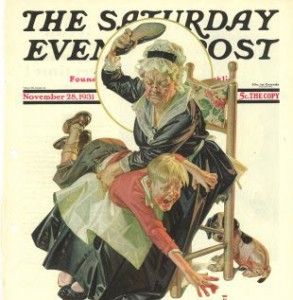
Following the approval of a child abuse bill that was officially signed into law this month by Delaware Governor Jack Markell, many Christians are expressing concern regarding their rights as parents to spank their children.
“This bill establishes the offense of child abuse,” a synopsis of the legislation outlines. “These new statutes combine current statutes and redefine physical injury and serious physical injury to reflect the medical realities of pain and impairment suffered by children. ”
While those that have reviewed the legislation have had no problem with aspects of the law that prohibit sexual abuse or other blatant maltreatment, one particular definition in the law is causing quite a stir.
“‘Physical injury’ to a child shall mean any impairment of physical condition or pain,” the bill outlines. “A person is guilty of child abuse in the third degree when the person recklessly or intentionally causes physical injury to a child through an act of abuse and/or neglect of such child. … A person is guilty of child abuse in the second degree when the person intentionally or recklessly causes physical injury to a child who is 3 years of age or younger.”
Criminal penalties include at least a year in prison, depending on the age of the child and the circumstances surrounding the particular situation.
“By defining ‘physical injury’ to include the infliction of pain on a child, spanking has become a crime in Delaware punishable by imprisonment,” lamented Home School Legal Defense Association (HSLDA) attorney Dewitt Black.
HSLDA had been fighting the legislation as it made its way through the legislative process this summer. It was introduced by state Senate Majority Leader Patricia Blevins, and co-sponsored by over 15 Senate and House representatives.
“Home School Legal Defense Association opposed this bill as a violation of the right of parents to direct the upbringing of their children, including the long-recognized right to administer reasonable corporal discipline,” Black outlined. “HSLDA worked with the Delaware Home Education Association and the Delaware Family Policy Council in an effort to bring about a defeat of this legislation.”
However, state Attorney General Beau Biden, son of Vice President Joe Biden, insists that the law does not prohibit spanking.
“This will not do anything to interfere with a parent’s right or ability to parent as they see fit, but it also makes it clear that if you abuse a child in any way, shape or form, we’re going to have a statute that we’re going to be able to use to protect kids,” he stated.
Nicole Theis, president of Delaware Family Policy Council, told Christian News Network that while Biden has consistently made this assertion, it still does not alleviate her worries about how the law will be enforced.
“The concern with the bill is that it used the very subjective word ‘pain’ [and hinged legal behavior upon] using ‘reasonable force,'” she outlined. “The fact of the matter is that it’s written into the law and it very much could be interpreted as prohibiting spanking.”
Theis said that she understood the difficulties in crafting laws that properly distinguish between protecting children from violence and subjecting parents who utilize corporal punishment to criminal penalties. She attended a number of hearings about the ordinance this year and heard both sides of the story.
“It is a hard balance,” she explained. “We do recognize that Delaware did need child abuse legislation for case workers to work with. … There was a lot of emotion on each side.”
The website StopSpanking.org similarly interpreted the ordinance as prohibiting spanking, despite assertions otherwise. It wrote briefly on its site, “Delaware is the first state to legislate against hitting children in an effort to stop child abuse. Senate Bill 234 effectively bans hitting of children, including in the home.”
Theis said that while it was too early at this point to announce what measures will be taken to protect innocent parents against the newly-enacted law, she believes that something should be done to amend the plain text of the ordinance.
“While we appreciate that it was not the intent of lawmakers to criminalize spanking, we hope that it bides us a little time to make an amendment to the law,” Theis concluded. “We definitely need some legal firepower to be able to resolve it.”
Become a Christian News Network Supporter...


